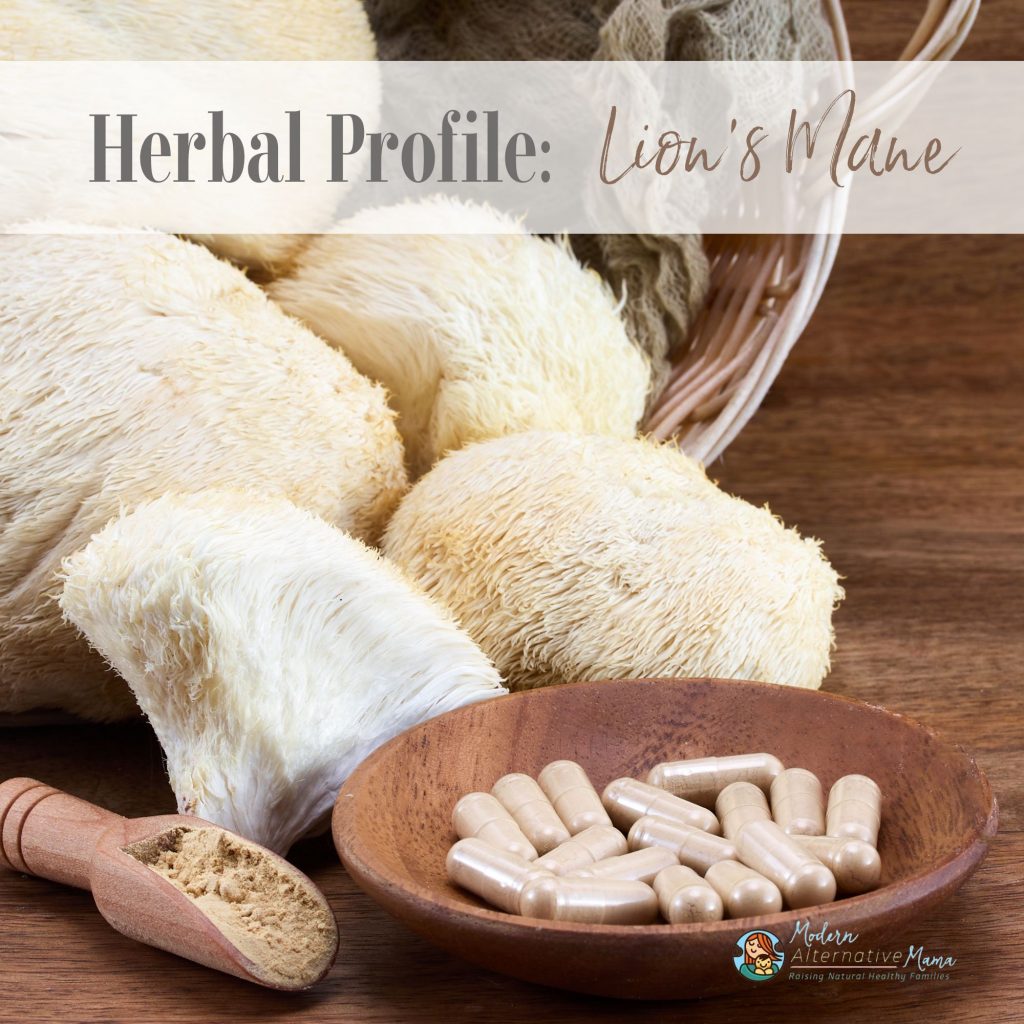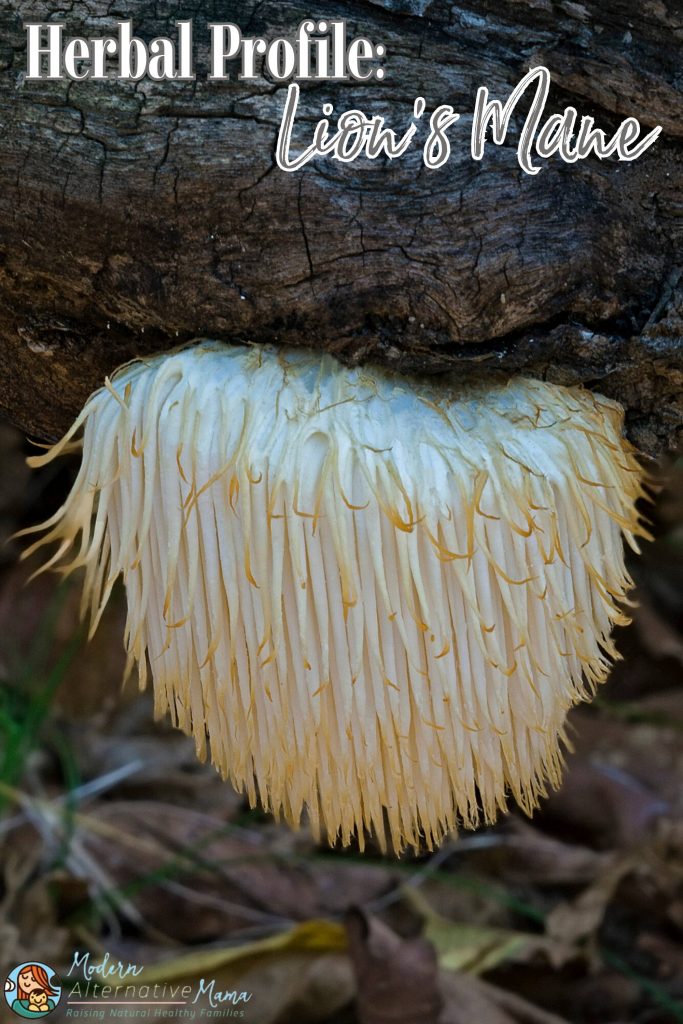What is Lion’s Mane
Lion’s mane, also referred to as mountain-priest mushroom, bearded tooth, pom pom mushrooms, or its scientific name Hericium erinaceus, is a common mushroom found in North America and Canada (1). Similarly to shiitake and reishi mushrooms, lion’s mane is saprotrophic, meaning it feeds off dead organic matter, such as a dead or dying tree, old stumps, or logs, which is where it grows (2).
Lion’s mane is easily distinguishable from other mushrooms by its white color and uniquely shaggy outer texture and appearance similar to a lion’s mane (3). Lion’s mane has two look-alikes, Hericium americanum (Bear’s head tooth) and Hericium coralloides (Coral tooth fungus). Both look-alikes are larger than lion’s mane, but neither is poisonous. According to the Real Mushrooms website, there are four key features to identify lion’s mane mushroom (4):
- White while fresh but turns yellow as it matures
- Large fruiting body of up to 16 inches in diameter
- Rounded mass of icicle-like spines
- Long spines of up to 2 inches long
If you want to learn more about mushrooms, check out Earthley’s unit study, Learn to Homestead: Wild Mushrooms.
Health Benefits of Lion’s Mane
Although lion’s mane has grown in popularity for culinary preparations, it’s also used for herbal remedies due to its well-documented health benefits, including:
Rich in Nutrients
The human body needs nutrients to flourish; without vital vitamins and minerals, the human body won’t function properly. Lion’s mane is rich in protein, fiber, manganese, phosphorus, potassium, and biotin, with trace amounts of vitamin D (4).
Antioxidant Properties
Antioxidants can help fight damage from harmful free radicals. The buildup of free radicals has been linked to chronic diseases, such as cancer and heart disease (5). Studies have found lion’s mane to exhibit antioxidant properties (6). One study found lion’s mane to be the fourth-highest mushroom with antioxidant properties of the 14 tested (7). Additionally, an in vitro study found lion’s mane suppressed oxidative damage and inflammation, which led to neuroprotective properties (8).
Anti-Inflammatory Properties
Although inflammation is a natural bodily response, chronic inflammation can lead to detrimental health effects. Chronic inflammation has been linked with many diseases, such as type 2 diabetes, asthma, and certain cancers (9). Thankfully, lion’s mane may help reduce inflammation.
In animal studies, lion’s mane extract reduced inflammation markers and oxidative stress, especially when managing inflammatory bowel diseases and liver damage (10,11,12,13). Another study found lion’s mane reduced health risks associated with obesity, like decreasing inflammation in fat tissue (14).
May Help Manage Stomach Ulcers
Stomach ulcers are open sores that develop on the stomach lining or upper portion of the small intestine due to Helicobacter pylori (H. pylori) or long-term use of nonsteroidal anti-inflammatory drugs (15). Test tube and animal studies have found lion’s mane extract may inhibit the growth of H. pylori, protecting stomach lining damage and the development of stomach ulcers (16,17,18). Additionally, an animal study found lion’s mane extract more effective at preventing alcohol-induced stomach ulcers without any toxicological signs in rat subjects (19).
Wound-Healing Properties
Wound-healing properties are the complex and dynamic process of restoring damaged tissue structure as closely as possible to its normal state (20). In an animal study, lion’s mane extract applied to neck wounds led to faster healing in rats (21). In another animal study, lion’s mane extract demonstrated a higher rate of wound closure in rats with excision wounds compared to the control group (22). Additionally, studies have found lion’s mane extract stimulates the growth and repair of nerve cells and improves the recovery speed of nerve injuries (23,24).
May Support the Immune System
The immune system protects the body from outside invaders, including bacteria, viruses, fungi, and toxins (25). When you support your immune system, you support your body’s ability to fight sickness and reduce the risk of serious illness. Lion’s mane demonstrated immunomodulatory activity in mice (26). Additionally, animal studies indicated that a protein in lion’s mane encourages the growth of beneficial gut bacteria, thanks to the gut-brain connection, influencing the strengthening of the immune system (27).
May Reduce Blood Sugar Levels
As of 2020, 34.2 million (1 in 10) Americans have diabetes, and another 88 million (1 in 3) Americans have prediabetes (28). On the bright side, several studies indicate lion’s mane may help lower blood sugar levels in normal and diabetic mice (29,30). An animal study found lion’s mane blocks the alpha-glucosidase enzyme responsible for breaking down carbohydrates and lowering blood sugar levels (31). Another animal study learned four weeks of lion’s mane extract influenced lower blood sugar levels in diabetic rats (32). Additionally, an animal study indicated six weeks of lion’s mane extract eases diabetic nerve pain (33).
May Promote Heart Health
Unfortunately, heart disease is the world’s number one cause of death (34). Due to the incredibly complex determinants of heart disease and various possible contributions, it’s hard to pinpoint an exact way to prevent it. Still, you can at least take steps to lower your overall risk. That’s where lion’s mane may come in.
Lion’s mane contains a compound called hericenone B, which can decrease blood clotting rates and the risk of heart attack or stroke (35). In vitro, lion’s mane demonstrated the ability to help prevent cholesterol oxidation in the bloodstream (36). Animal studies have found that lion’s mane extract decreases triglyceride levels and improves fat metabolism (37). Another study found daily supplementation with lion’s mane extract for 28 days led to 27% lower triglyceride levels and 42% less weight gain in rats fed a high-fat diet (38).
May Support Brain Health
Brain health refers to cognitive health, motor functions, emotional functions, and tactile functions. Brain functions may decrease across several areas as we age due to neurological conditions like Alzheimer’s, Parkinson’s, or even amyloid plaques (39). Parkinson’s, Alzheimer’s, dementia, multiple sclerosis (MS), and other brain diseases are associated with inflammation (40,41,42). Thankfully, lion’s mane may help protect against these conditions.
One study found the hericenones and erinacines compounds of lion’s mane can stimulate the growth of brain cells (43). Animal studies have confirmed lion’s mane extract has neuroprotective properties that reduce symptoms of memory loss and prevent neuronal damage associated with amyloid-beta plaque (44,45,46). Additionally, an animal study found that lion’s mane supplementation improved object recognition and memory in mice (47).
The neuroprotective benefits of lion’s mane has also been studied in humans. An older human study found daily supplementation of lion’s mane for 16 weeks resulted in better cognitive function but decreased when supplementation ended (48). A more recent human study found that 1 gram of lion’s mane for 49 weeks significantly improved cognitive test scores in Alzheimer’s patients (49).
May Improve Mental Health
Worldwide, 970 million people struggle with mental health, resulting in approximately 8 million deaths annually, accounting for 14.3% of worldwide deaths (50). Thankfully, lion’s mane may help. Animal studies have revealed the anti-inflammatory effects of lion’s mane reduced symptoms of anxiety and depression in mice (51). Other animal studies found lion’s mane extract helped regenerate brain cells and improve the functionality of the hippocampus region of the brain, which is responsible for memory and emotional responses (52,53). A human study found that consuming lion’s mane in cookies daily for four weeks reduced feelings of irritation and anxiety in menopausal patients (54).
Anticancer Properties
Statistics say that 158.3 of every 100,000 individuals will die from cancer, but what if they didn’t have to (55)? Several studies indicate that lion’s mane has cancer-fighting compounds (56,57). In vitro, lion’s mane extract killed the cells of blood, colon, liver, and stomach cancer (58,59,60). An animal study found lion’s mane extract reduced the spread of cancer by 69% in mice with colon cancer (61). Another animal study found that lion’s mane extract slowed tumor growth more effectively, with fewer side effects than pharmaceutical medications (62).
Safety Concerns
According to mainstream sources, consuming lion’s mane is possibly safe when used in a dose of 1 gram daily for 16 weeks. They state it may slow blood clotting, and possible side effects, like stomach discomfort, are mild. Additionally, they claim there isn’t enough reliable information to know if lion’s mane is safe while pregnant, breastfeeding, or when applied to the skin (63).
Although I couldn’t find any herbalists who spoke on the safety profile of lion’s mane, many recommended starting at 1 mg and increasing the dosage if needed (64). I’d like to note that lion’s mane is a mushroom, a food that can be purchased in many grocery stores. To claim a mushroom with as many documented health benefits as lion’s mane is potentially unsafe is unrealistic. Lion’s mane is used as a meat substitute throughout the plant-based community, and it is completely safe to consume, even while pregnant and breastfeeding.
How to Use Lion’s Mane
You can find lion’s mane as whole mushrooms and in pills, powders, extracts, or tinctures. Tinctures always contain the most concentrated amount of herbs. Teas and soups are also options, especially when following Ayurvedic medicine recipes. If you’re a DIY person, some great starter recipes are:
- How to Make an Alcohol Extraction (With Almost Any Herb) – to make a lion’s mane tincture
- How to Make a Glycerin Extraction (With Almost Any Herb) – to make an alcohol-free lion’s mane tincture
Follow the recommendations of any supplement; some of my recommendations include:
- Earthley’s 5-Mushroom Super Blend Capsules support the brain and immune system. Mushrooms have been shown to enhance cognitive functions like learning and memory while also aiding in support against symptoms of depression, anxiety, stress, neurological disorders, and more. Our chosen superstar mushrooms are high in anti-inflammatory and antioxidant properties to improve immunity and overall health.
- Earthley’s Mushroom Tincture is a great way to get the benefits of medicinal mushrooms in a highly bioavailable liquid form. We use only the whole fruiting bodies to create our tincture, not mycelium (which has fewer benefits). Experience improved mental health and clarity, immune support, lowered inflammation, and more!
Disclaimer: This post is not intended as medical advice. These statements have not been evaluated by the FDA, and nothing in this post is intended to diagnose, treat, or cure anything. If you have questions, please do your own research or seek advice from a health professional.








